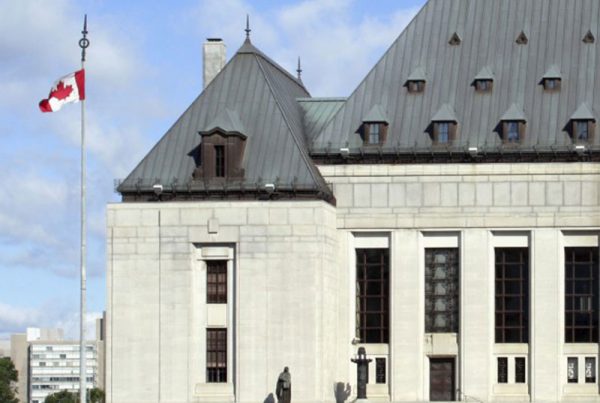Le 24 juillet 2025, la Cour suprême du Canada (CSC) a rejeté un recours qui contestait la constitutionnalité de deux infractions liées au travail du sexe dans la loi sur le commerce du sexe. Code criminel. Les appelants dans l'affaire Kloubakov sont des tiers (non-travailleurs du sexe) qui ont contesté les interdictions de se procurer des services sexuels et d'en tirer un avantage matériel, en faisant valoir qu'elles violaient les droits des travailleurs du sexe à la vie, à la liberté et à la sécurité de la personne (article 7 de la loi sur les travailleurs du sexe). chartes).
Ces dispositions font partie de la réponse du Parlement à la décision historique de la CSC dans l'affaire Canada v Bedford. Dans le cadre de l'exercice 2013 Bedford La CSC a estimé que les décisions antérieures de la Code criminel les dispositions interdisant aux travailleurs du sexe d'accéder aux mesures visant à protéger leur sécurité sont inconstitutionnelles car elles exposent les travailleurs du sexe à des conditions dangereuses et les exposent à des risques de violence et d'autres préjudices.
Les appelants dans l'affaire Kloubakov a fait valoir que la loi contestée Code criminel n'ont pas abordé de manière substantielle et rigoureuse les préjudices identifiés dans l'affaire Bedford. Cependant, la CSC n'a pas été d'accord, estimant que, lorsqu'elles sont interprétées correctement, les deux infractions permettent aux travailleurs du sexe, ou aux personnes qu'ils embauchent, de mettre en œuvre les mesures de sécurité recommandées dans le document Bedford. Ces mesures comprennent l'utilisation de lieux fixes, l'embauche de tiers pour fournir des services, la collaboration avec d'autres travailleurs du sexe et l'échange d'informations sur les conditions de travail sûres.
Bien que cette interprétation de la loi clarifie certaines des façons dont les travailleurs du sexe peuvent protéger leur sécurité, elle ne répond que partiellement aux nombreuses préoccupations soulevées par le nouveau régime fédéral régissant le travail du sexe. Par exemple, la CSC a refusé de se prononcer sur la question de savoir si les travailleurs du sexe courent un plus grand risque de préjudice du fait qu'ils n'ont pas accès aux services de sécurité offerts par les "entreprises commerciales", telles que les agences d'escorte commerciales, plutôt que de louer des services de sécurité eux-mêmes ou par le biais d'un accord de coopération avec d'autres travailleurs du sexe.
L'ACLC est intervenue dans Kloubakov d'affirmer que la sécurité des travailleurs du sexe doit être considérée comme un objectif fondamental de la nouvelle loi sur la protection des droits de l'homme. Code criminel à la lumière des dispositions de la Bedford l'affaire. Comme le montre l'analyse de la Cour sur les droits des travailleurs du sexe, il n'y a pas de raison de s'inquiéter. chartes-L'analyse des droits à la vie, à la liberté et à la sécurité de la personne protégés par l'article 7 exigeait qu'elle compare l'impact des nouvelles dispositions avec les objectifs visés, la manière dont ces objectifs étaient formulés étant cruciale pour l'analyse de l'article 7.
Il est décevant que la CSC n'ait pas donné la priorité à l'objectif de sûreté et de sécurité dans son analyse, le traitant plutôt comme une priorité parmi d'autres. Il est également décevant que la CSC n'ait pas pris en compte de manière significative les preuves relatives aux expériences vécues par les travailleurs du sexe, notamment en refusant aux groupes représentant les travailleurs du sexe la permission d'intervenir. Ce débat n'est pas encore terminé, car certaines des questions sur lesquelles la CSC a refusé de se prononcer sont carrément soulevées dans la Alliance canadienne pour la réforme du droit du travail sexuel c. Canada L'affaire est actuellement pendante devant la Cour d'appel de l'Ontario. L'affaire est actuellement pendante devant la Cour d'appel de l'Ontario.
L'ACLC est reconnaissante pour l'excellent pro bono représentation de Zain Naqi et Annecy Pang de Lax O'Sullivan Lisus Gottlieb LLP dans cette affaire.
À propos de l’association canadienne sur les libertés civiles
L’ACLC est un organisme indépendant à but non lucratif qui compte des sympathisant.e.s dans tout le pays. Fondé en 1964, c’est un organisme qui œuvre à l’échelle du Canada à la protection des droits et des libertés civiles de toute sa population.
Pour les médias
Pour d'autres commentaires, veuillez nous contacter à media@ccla.org.
Pour les mises à jour en direct
Veuillez continuer à vous référer à cette page et à nos plateformes de médias sociaux. On est dessus Instagram, Facebook, Twitter et Ciel bleu.





